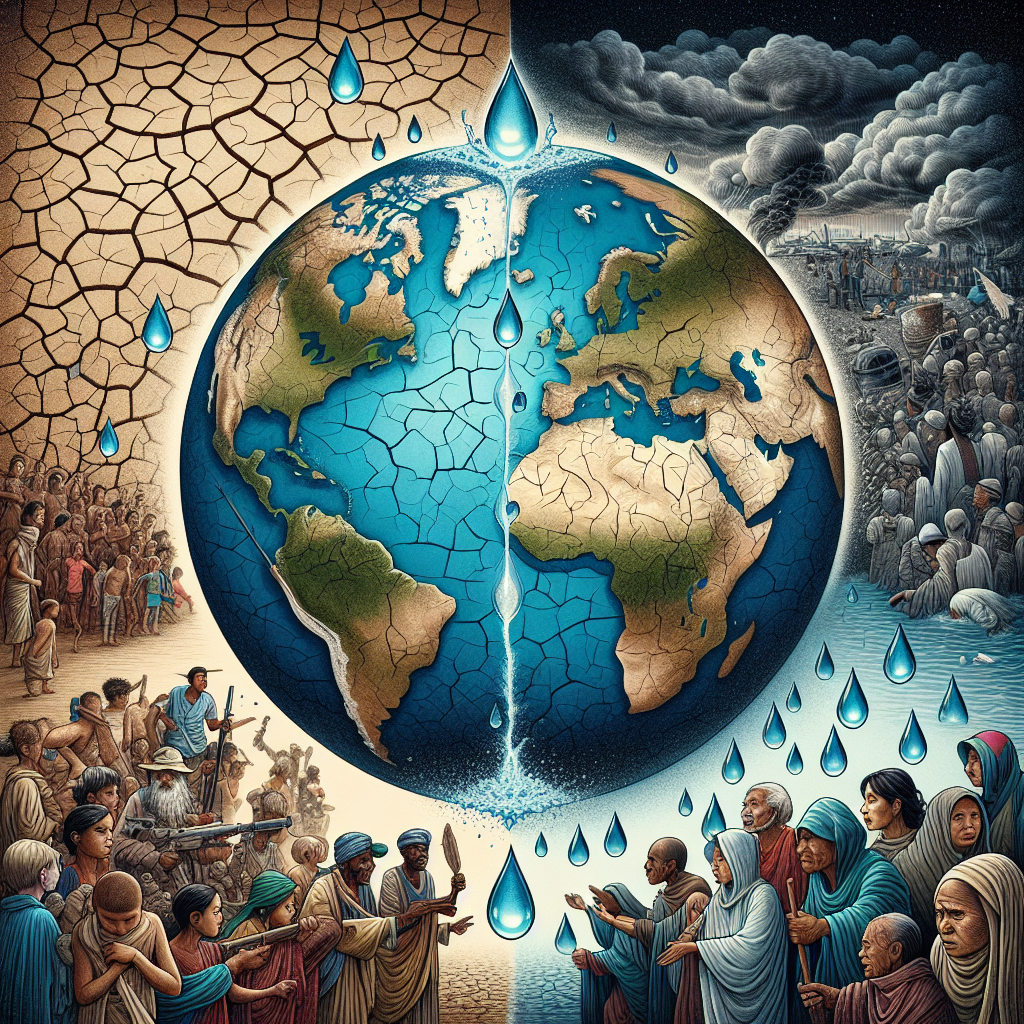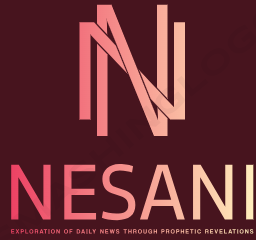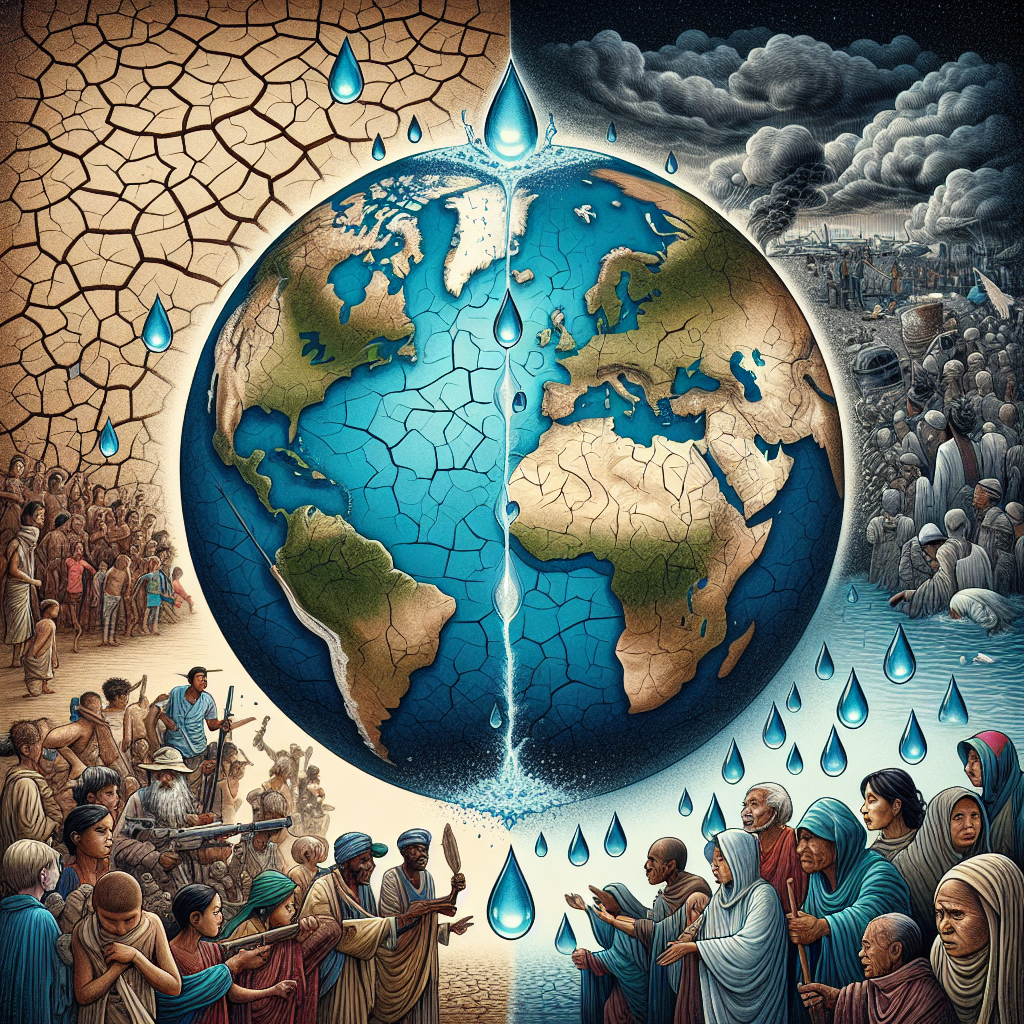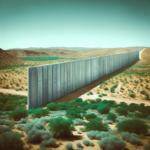Ever wondered how water resources play a pivotal role in conflicts? Brace yourself as we navigate through the tangled web of the ongoing struggle surrounding water access and its significance in various conflicts worldwide. From ancient times to the present day, water has been more than just a basic necessity; it holds the power to shape nations, fuel wars, and trigger political tensions. Today, we will explore the intricate relationship between water resources and conflict, uncovering the hidden narratives and historical context that shed light on this often overlooked dimension of global disputes.
Overview of the Conflict
Water has always played a crucial role in conflicts throughout history, and the Israeli-Palestinian conflict is no exception. In this article, we will explore the intricate relationship between water resources and this ongoing dispute. By examining the geographical background and providing a brief history of the conflict, we can better understand why water resources are of immense importance in this region.
Geographical Background
The Israeli-Palestinian conflict primarily takes place in the arid and semi-arid Middle East region. The area is characterized by limited water resources and a high demand for water due to population growth and agricultural needs. The Eastern Mediterranean region, where Israel and Palestine are located, faces water scarcity challenges, exacerbating tensions related to water allocation and usage.
Brief History of the Conflict
The Israeli-Palestinian conflict is a multifaceted issue with deep historical roots. Dating back to the early 20th century, the conflict revolves around competing claims to the land and sovereignty between Israelis and Palestinians. The establishment of the State of Israel in 1948, the subsequent Arab-Israeli wars, and the ongoing political disputes have shaped the modern conflict. Water resources have become a significant point of contention, aggravating the already complex situation.
Importance of Water Resources
Water resources hold immense importance in this conflict for several reasons. First, water is vital for sustaining life and enabling livelihoods. Both Israelis and Palestinians rely on water for agriculture, domestic use, and industrial purposes. Second, historical and religious narratives also contribute to the significance of water, such as the religious importance of the River Jordan for both Judaism and Christianity. Lastly, water resources hold strategic value, providing leverage and control over the opposing side.
Water as a Contested Resource
Water Scarcity
Water scarcity is a pressing issue in the region, with limited freshwater sources unable to meet the growing demands of the population. The scarcity intensifies competition between Israelis and Palestinians, leading to conflicts over access to water and equitable distribution. The arid climate and irregular precipitation patterns exacerbate this scarcity, making effective water management crucial.
Disputed Water Sources
Several water sources have become points of contention in the Israeli-Palestinian conflict. The Jordan River, which serves as a key water source, has been a subject of dispute for many years. Additionally, the Mountain Aquifer, a shared underground water resource, is another focal point of contention. Both sides argue over their rightful share, leading to tensions and disagreements.
Water-related Infrastructure
Infrastructure related to water, such as dams, wells, and water pipelines, also plays a significant role in the conflict. The construction of infrastructure projects by either side can affect water availability and access for the opposing party. These actions are often seen as a tool for asserting control over water resources and exerting power in the conflict.

Political Factors
Control and Access to Water
Control and access to water resources have been used as political tools in the Israeli-Palestinian conflict. Various policies and practices, including the establishment of Israeli settlements, have a direct impact on water availability for Palestinians. Palestinians argue that these Israeli policies limit their access to water and hinder their development, deepening the inequalities in resource distribution.
Water as a Strategic Tool
Water resources hold strategic value in the conflict, providing a means of exerting control and pressure on the opposing side. By controlling access to water, one party can influence the daily lives, economy, and development of the other. This has led to accusations of water-related hegemony and manipulation as a tactic to gain an upper hand in the conflict.
Water-related Diplomacy
Water-related issues have also become part of diplomatic negotiations between Israelis and Palestinians. Water-sharing agreements and the management of joint water resources are part of broader discussions aimed at finding a peaceful resolution to the conflict. International stakeholders, such as the United Nations and various NGOs, play a role in facilitating these diplomatic efforts to address water-related concerns.
Environmental Impacts
Water Pollution and Contamination
Unregulated industrial activities, agricultural practices, and inadequate wastewater treatment contribute to water pollution and contamination in the region. The Israeli-Palestinian conflict has hindered efforts to establish effective environmental regulations and enforcement mechanisms. As a result, both Israelis and Palestinians face the consequences of deteriorating water quality, posing threats to public health and ecosystems.
Ecosystem Destruction
The degradation and destruction of ecosystems are further environmental impacts of the conflict. Unsustainable water extraction practices, the diversion of watercourses, and land degradation have adverse effects on biodiversity and the delicate balance of ecosystems. This loss of natural habitats disrupts ecosystems’ resilience, exacerbating the environmental challenges faced by both Israelis and Palestinians.
Climate Change Effects
Climate change adds another layer of complexity to the conflict and exacerbates the existing challenges related to water resources. Rising temperatures, changing precipitation patterns, and increased water evaporation rates further intensify water scarcity. Both Israelis and Palestinians will have to adapt to these climate change effects and work together to find sustainable solutions to address the changing environmental conditions.

Humanitarian Concerns and Public Health
Lack of Clean Water Availability
One of the most pressing humanitarian concerns in the Israeli-Palestinian conflict is the lack of clean water availability for Palestinians. Many Palestinian communities struggle with limited access to safe drinking water, leading to reliance on unsafe water sources and increased vulnerability to waterborne diseases. This lack of access to clean water poses significant health risks and hampers the overall well-being of the population.
Sanitation and Hygiene Issues
Inadequate sanitation infrastructure and poor hygiene practices further compound the challenges faced by Palestinians. The lack of proper sewage systems and sanitation facilities contribute to the contamination of water sources, perpetuating a cycle of disease and ill health. Improving sanitation conditions and promoting proper hygiene practices are essential for safeguarding public health in the region.
Health Risks and Diseases
The scarcity of clean water, along with compromised sanitation and hygiene practices, increases the risk of waterborne diseases and other health issues. Palestinians are susceptible to ailments such as diarrhea, cholera, and hepatitis due to the lack of access to safe water and inadequate sanitation infrastructure. The ongoing conflict hampers efforts to improve healthcare services and address these health risks effectively.
Water-related Conflicts and Disputes
Historical Water-related Conflicts
Water-related conflicts and disputes between Israelis and Palestinians have occurred throughout history. The conflict over water resources has been a recurrent theme, with disputes over the allocation and control of water sources. These historical conflicts have contributed to the deep-rooted mistrust between the parties and continue to shape the ongoing dispute.
Current Water-related Disputes
Contemporary water-related disputes continue to strain relations between Israelis and Palestinians. Disagreements over water allocation, infrastructure projects, and access to water sources remain unresolved. The lack of a comprehensive water-sharing agreement, coupled with the politicization of water resources, perpetuates tensions and hampers the potential for cooperation.
Resolution Efforts
Despite the challenges, various efforts have been made to address water-related disputes between Israelis and Palestinians. International organizations and NGOs have facilitated dialogue and provided support for conflict resolution initiatives. The search for equitable and sustainable solutions remains a priority for stakeholders involved in the resolution of the Israeli-Palestinian conflict.
International Water Laws and Agreements
Existing Legal Frameworks
International water laws and agreements play a crucial role in shaping the management of transboundary water resources. The principles of customary international law, such as the principle of equitable and reasonable utilization, provide a basis for negotiations and cooperation. Additionally, legal frameworks like the Helsinki Rules and the United Nations Watercourses Convention offer guidelines for resolving conflicts over shared water resources.
Transboundary Water Cooperation
Transboundary water cooperation is vital for finding mutually beneficial solutions to water-related conflicts. Shared water resources necessitate collaboration and the implementation of joint management mechanisms. While such cooperation has faced challenges in the Israeli-Palestinian context, there have been instances of cooperation on specific water projects, highlighting the potential for further transboundary collaboration.
Challenges and Future Perspectives
Challenges persist in the implementation of international water laws and agreements in the context of the Israeli-Palestinian conflict. Political tensions, historical grievances, and differing power dynamics hinder the effective utilization of these frameworks. Addressing these challenges requires enhanced political will, trust-building measures, and a commitment to resolving water-related disputes in a fair and cooperative manner.
Water Management and Sustainable Solutions
Integrated Water Resource Management
Integrated Water Resource Management (IWRM) is a holistic approach to managing water resources sustainably. It considers the interconnectedness of water, land, and related ecosystems, along with social and economic factors. Implementing IWRM principles can help address the water scarcity challenges faced by both Israelis and Palestinians and promote sustainable water management practices.
Water Conservation and Efficiency
Water conservation and efficiency measures play a vital role in mitigating water scarcity. By promoting water-saving technologies, efficient irrigation systems, and improved water management practices, Israelis and Palestinians can reduce water wastage and enhance the resilience of their water systems. These measures encourage responsible water use and can contribute to long-term sustainability.
Desalination Technologies
Desalination technologies offer an alternative source of freshwater in water-scarce regions. Israel has become a global leader in desalination, utilizing innovative methods to transform seawater into potable water. Expanding the use of desalination technologies and sharing expertise could benefit Palestinians and help alleviate water scarcity concerns in the region.
Role of Water in Peacebuilding
Water as a Catalyst for Cooperation
Water resources have the potential to serve as a catalyst for cooperation and peacebuilding between Israelis and Palestinians. By recognizing the interdependence of their water systems, both parties can find common ground and work together towards sustainable solutions. Shared water challenges could become a unifying factor, fostering dialogue and cooperation in other areas of the conflict.
Hydrodiplomacy and Water Mediation
Hydrodiplomacy, a term coined to describe diplomacy focused on water-related issues, holds promise in the context of the Israeli-Palestinian conflict. Water mediation processes, facilitated by impartial third parties, can help bridge the gap between Israelis and Palestinians and facilitate dialogue on water-related concerns. These efforts can contribute to building trust and finding shared solutions.
Transboundary Water Governance
Establishing effective transboundary water governance mechanisms is crucial for ensuring equitable water allocation and cooperation. Joint management institutions, involving representatives from both Israelis and Palestinians, can work towards coordinating water usage, resolving disputes, and ensuring sustainable water management. Transparent and inclusive governance structures can foster trust and collaboration.
Future Prospects and Recommendations
Water Security and Conflict Prevention
Ensuring water security for all stakeholders is essential for preventing further conflicts related to water resources. International actors, including the United Nations and regional organizations, have a role to play in promoting sustainable water management practices and supporting the development of infrastructure to enhance water security. Addressing the root causes of the conflict, including water-related grievances, is vital for long-term peace.
Cooperation for Sustainable Water Management
Promoting cooperation between Israelis and Palestinians in the field of water management is crucial for sustainable development in the region. Encouraging joint projects, knowledge exchange, and transboundary water-sharing agreements can foster trust and mutual understanding. By prioritizing cooperation and recognizing the shared nature of water challenges, both parties can work towards a more sustainable future.
Building Trust and Collaboration
Building trust between Israelis and Palestinians is fundamental for resolving water-related disputes and the broader conflict. Confidence-building measures, dialogue forums, and enhanced communication channels can help break the cycle of mistrust and promote collaboration. Engaging communities and civil society organizations in joint water management initiatives can also contribute to building lasting peace and fostering understanding.
In conclusion, water resources play a critical and contested role in the Israeli-Palestinian conflict. The scarcity of water, control and access issues, environmental impacts, humanitarian concerns, and historical disputes all contribute to the complex nature of this issue. However, through effective water management, sustainable solutions, and greater cooperation, there is hope for a future where water no longer fuels the conflict but becomes a bridge towards peace and prosperity in the region.




